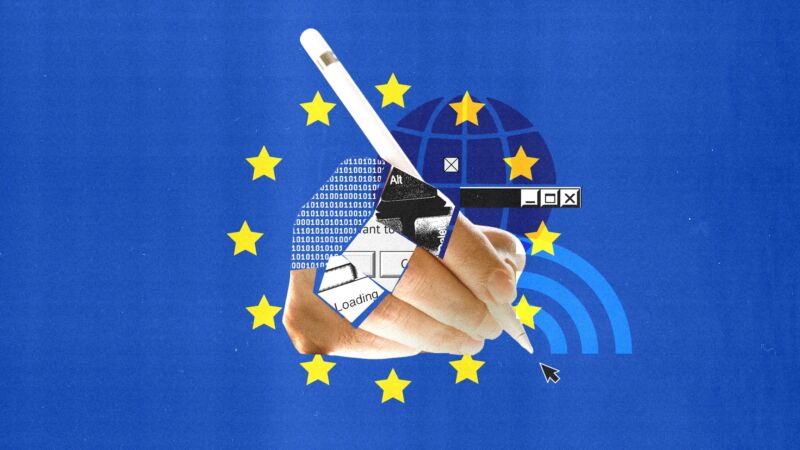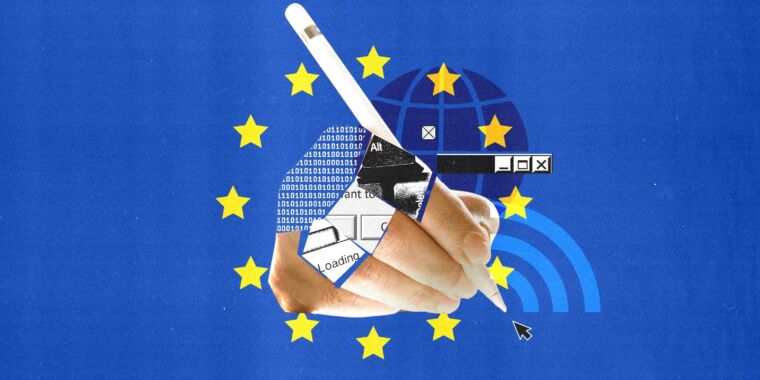
Elena Lacey/Getty Images
Next week, a law will go into effect that will change the internet forever — and make it much harder to be a tech giant. On November 1, the European Union’s Digital Markets Act will come into effect, starting the clock on a process that is expected to force Amazon, Google and Meta to make their platforms more open and interoperable by 2023. That could mean big changes in what people can do with their devices and apps, in a new reminder that Europe has been regulating tech companies much more actively than the US.
“We expect the consequences to be significant,” said Gerard de Graaf, an experienced EU official who helped pass the DMA early this year. Last month, he became director of a new EU office in San Francisco, co-founded to explain the implications of the law to big tech companies. The Graaf says they will be forced to break open their walled gardens.

“If you have an iPhone, you should be able to download apps not only from the App Store, but also from other app stores or from the Internet,” says de Graaf in an emerald-accented conference room at the Irish Consulate in San Francisco, where the EU office is originally located. The DMA requires dominant platforms to let in smaller competitors and can also force Meta’s WhatsApp to receive messages from competing apps such as Signal or Telegram, or prevent Amazon, Apple and Google from favoring their own apps and services.
While the DMA goes into effect next week, tech platforms don’t have to comply immediately. The EU must first decide which companies are large and entrenched enough to be classified as “gatekeepers”, subject to the strictest rules. De Graaf expects that there will be about ten companies in that group, which will be announced in the spring. Those gatekeepers then have six months to comply with the requirements.
De Graaf has predicted a spate of lawsuits challenging Europe’s new rules for Big Tech, but says he’s in California to show the Silicon Valley giants that the rules have changed. The EU has previously imposed hefty fines on Google, Apple and others through antitrust investigations, a mechanism that places the burden of proof on bureaucrats, he says. Under DMA, it is the company’s responsibility to stay in line. “The most important message is that the negotiations are over, we are in a compliance situation,” says de Graaf. “You may not like it, but that’s the way it is.”
Like the EU’s digital privacy law, GDPR, the DMA is expected to lead to changes in how technology platforms serve people beyond the 400 million internet users in the EU as some details of compliance will be more easily implemented globally.
Tech companies will also soon face a second sweeping EU law, the Digital Services Act, which requires risk assessments of some algorithms and disclosures about automated decision-making and could force social apps like TikTok to open up their data to outside scrutiny. The law is also being phased in, with the largest online platforms expected to be compliant by mid-2024. The EU is also considering adopting specific rules for artificial intelligence, which could ban some use cases of the technology.
De Graaf argues that stricter rules for tech giants are not only necessary to protect people and other companies against unfair practices, but also to allow society to take full advantage of technology. He was critical of a non-binding AI Bill of Rights recently released by the White House, saying a lack of strict regulation could undermine public confidence in technology. “If our citizens lose faith in AI because they think it discriminates against them and leads to outcomes that are harmful to their lives,” he says, “they will shun AI, and it will never be successful.”
The EU’s new office has been opened following recent moves by the bloc and the US to step up cooperation on technology policy. De Graaf says both sides are interested in finding ways to tackle chip shortages and the ways in which authoritarian governments can leverage technology and the internet.
He also plans a trip to Sacramento to meet with California state legislators, who he says have been pioneers in their fight against Big Tech. They passed a bill last month that requires strict standard children’s privacy settings and controls over how companies use data they collect about children. The U.S. Congress has passed relatively little legislation in recent years that impacts the tech industry, aside from the $52 billion CHIPS and Science Act to support semiconductor manufacturing in July.
Marlena Wisniak, who leads the work on technology at the civil liberties group, the European Center for Not for Profit Law, sees the EU’s new presence in the tech industry’s backyard as further proof that it is serious to shape technology policy worldwide. She says De Graaf should use some of that power to help people who depend on Big Tech platforms outside the US and EU, which are rarely represented in tech diplomacy.
Wisniak also hopes the EU’s digital envoys can avoid falling into the trap that derailed the plans of some previous entrants to Silicon Valley, a place with far more executives, entrepreneurs and investors than policy experts. “I hope EU policymakers are not blinded by the tech hype,” she says. “The story of the tech bro is real.”
This story originally appeared on wired.com.

